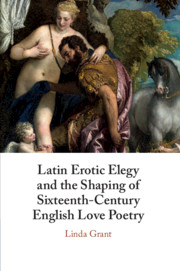Book contents
- Latin Erotic Elegy and the Shaping of Sixteenth-Century English Love Poetry
- Latin Erotic Elegy and the Shaping of Sixteenth-Century English Love Poetry
- Copyright page
- Contents
- Textual Note
- Introduction
- Chapter 1 ‘Ovid Was There and with Him Were Catullus, Propertius and Tibullus’
- Chapter 2 ‘For Truth and Faith in Her Is Laid Apart’
- Chapter 3 ‘“Fool,” Said My Muse to Me’
- Chapter 4 ‘In Six Numbers Let My Work Rise, and Subside in Five’
- Chapter 5 ‘My Heart … with Love Did Inly Burn’
- Conclusion
- Notes
- Bibliography
- Index
Chapter 5 - ‘My Heart … with Love Did Inly Burn’
Female Authorship and Desire in Sulpicia, Mary Sidney’s Antonie and Mary Wroth’s Pamphilia to Amphilanthus 1
Published online by Cambridge University Press: 19 August 2019
- Latin Erotic Elegy and the Shaping of Sixteenth-Century English Love Poetry
- Latin Erotic Elegy and the Shaping of Sixteenth-Century English Love Poetry
- Copyright page
- Contents
- Textual Note
- Introduction
- Chapter 1 ‘Ovid Was There and with Him Were Catullus, Propertius and Tibullus’
- Chapter 2 ‘For Truth and Faith in Her Is Laid Apart’
- Chapter 3 ‘“Fool,” Said My Muse to Me’
- Chapter 4 ‘In Six Numbers Let My Work Rise, and Subside in Five’
- Chapter 5 ‘My Heart … with Love Did Inly Burn’
- Conclusion
- Notes
- Bibliography
- Index
Summary
This chapter is concerned with Sulpicia’s female-authored elegies, Mary Sidney’s translations of Petrarch’s Triumph of Death, and of Robert Garnier’s Antonie, both texts which make prominent use of a female voice of desire, and Mary Wroth’s first sonnet from her Pamphilia to Amphilanthus. The argument here is not so much that Sulpicia is a model for Sidney and Wroth as an exploration, in each period, of what happens when a female author/narrator inserts herself into a discourse which is primarily gendered masculine. It analyses how previous instances of ventriloquised female voices in male authored elegy and Renaissance love poetry open up a space into which it is possible for a female author to insert herself. Of special interest is the question of what happens when the female beloved speaks up, speaks back, speaks for herself.
Keywords
- Type
- Chapter
- Information
- Latin Erotic Elegy and the Shaping of Sixteenth-Century English Love PoetryLascivious Poets, pp. 151 - 188Publisher: Cambridge University PressPrint publication year: 2019

